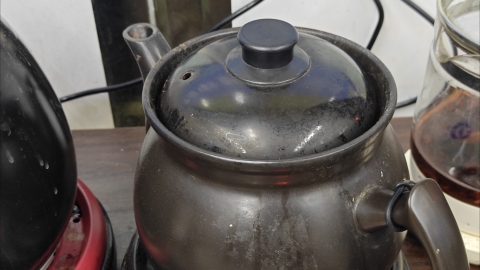What Should Not Be Eaten When Taking Traditional Chinese Medicine
Generally, during the period of taking traditional Chinese medicine (TCM), attention should be paid to diet and medication combinations. It is not recommended to consume foods such as spicy hot pot, strong tea, raw cold crabs, greasy fried chicken, or radishes. Medications should be strictly taken as prescribed by a physician. Self-administration of drugs such as ferrous sulfate tablets, levofloxacin hydrochloride capsules, dexamethasone tablets, ibuprofen granules, and chlorpheniramine maleate tablets should not be advised. The detailed explanations are as follows:
I. Foods
1. Spicy Hot Pot
Spicy hot pot contains large amounts of spicy seasonings such as chili peppers and Sichuan peppercorns. These ingredients can easily generate internal heat. If the TCM being taken is of the heat-clearing and fire-purging or yin-nourishing and moisture-lubricating types, the efficacy of the medicine may be counteracted. If the TCM is of the warming interior and dispelling cold type, consuming spicy hot pot may intensify internal heat, leading to symptoms such as dry mouth and sore throat, which are detrimental to condition management. Therefore, it is not recommended.
2. Strong Tea
Strong tea contains significant amounts of tannic acid, which can bind with alkaloids and proteins—effective components in TCM—to form precipitates that are difficult to absorb. This reduces the efficacy of the herbal medicine and affects the body's absorption and utilization of the drug. Therefore, consumption of strong tea should be avoided during TCM treatment.

3. Raw Cold Crabs
Raw cold crabs are of a cold nature and may carry bacteria. During TCM treatment, the body is often in a state of regulation, and the functions of the spleen and stomach are relatively sensitive. Consumption of raw cold crabs may irritate the gastrointestinal tract, causing discomfort such as abdominal pain and diarrhea. If the TCM is of the warming yang and strengthening the spleen type, the warming effect of the medicine may be weakened, which is not conducive to recovery. Therefore, it is not recommended.
4. Greasy Fried Chicken
Greasy fried chicken is high in fat and difficult to digest, which increases the burden on the spleen and stomach and affects their absorption of TCM. At the same time, greasy foods may hinder the transportation and effectiveness of active components of TCM in the body, reducing its efficacy and being detrimental to body regulation. Therefore, it is not recommended.
5. Radish
Radish has the effect of promoting qi circulation and breaking up stagnation. If the TCM being taken is of the nourishing and tonifying type, radish may weaken its nourishing effects, affecting the body's nourishment of qi and blood and the internal organs, which is not conducive to regulating a weak constitution. Therefore, radish should be avoided when taking nourishing TCM.
II. Medications
1. Ferrous Sulfate Tablets
Ferrous sulfate tablets are commonly used for iron supplementation. The iron ions they contain may bind with tannic acid and alkaloids in TCM to form insoluble compounds, which affect both iron absorption and the efficacy of TCM, and may cause gastrointestinal discomfort. Therefore, it is not recommended to take them together with TCM; a gap of at least two hours should be maintained.
2. Levofloxacin Hydrochloride Capsules
This is a quinolone antibiotic. If the TCM contains ingredients such as licorice or schisandra, it may affect the metabolism of this drug, increasing its accumulation in the body and raising the risk of adverse reactions such as nausea and dizziness. Therefore, self-administration is not recommended; follow medical advice.
3. Dexamethasone Tablets
This is a glucocorticoid. If the TCM is used for regulating endocrine or immune functions, dexamethasone may interfere with the body's natural regulatory mechanisms and conflict with the effects of the TCM. Long-term use may also affect the TCM's restoration of organ functions, which is detrimental to condition stability. Therefore, self-administration is not recommended.
4. Ibuprofen Granules
Ibuprofen granules have antipyretic and analgesic effects. If the TCM contains heat-clearing and detoxifying ingredients, short-term combined use may enhance fever-reducing effects, but long-term concurrent use may increase gastrointestinal irritation, causing discomfort such as stomach pain and diarrhea. It may also affect the TCM's fundamental regulation of the underlying cause of the condition. Therefore, self-administration is not recommended.
5. Chlorpheniramine Maleate Tablets
This is an antihistamine with sedative effects. If the TCM is used for calming the nerves and improving sleep or regulating the nervous system, the sedative effects may be enhanced, leading to increased symptoms such as drowsiness and fatigue. If the TCM is used for awakening the mind and improving consciousness, its effects may be counteracted, affecting the treatment outcome. Therefore, self-administration is not recommended.
In daily life, a light diet, regular作息, and avoiding staying up late and excessive fatigue are also important. If other medications are needed or discomfort occurs during TCM treatment, timely consultation with the TCM-prescribing physician is essential. Do not adjust the diet or medication regimen on your own to ensure the effectiveness and safety of TCM treatment.





